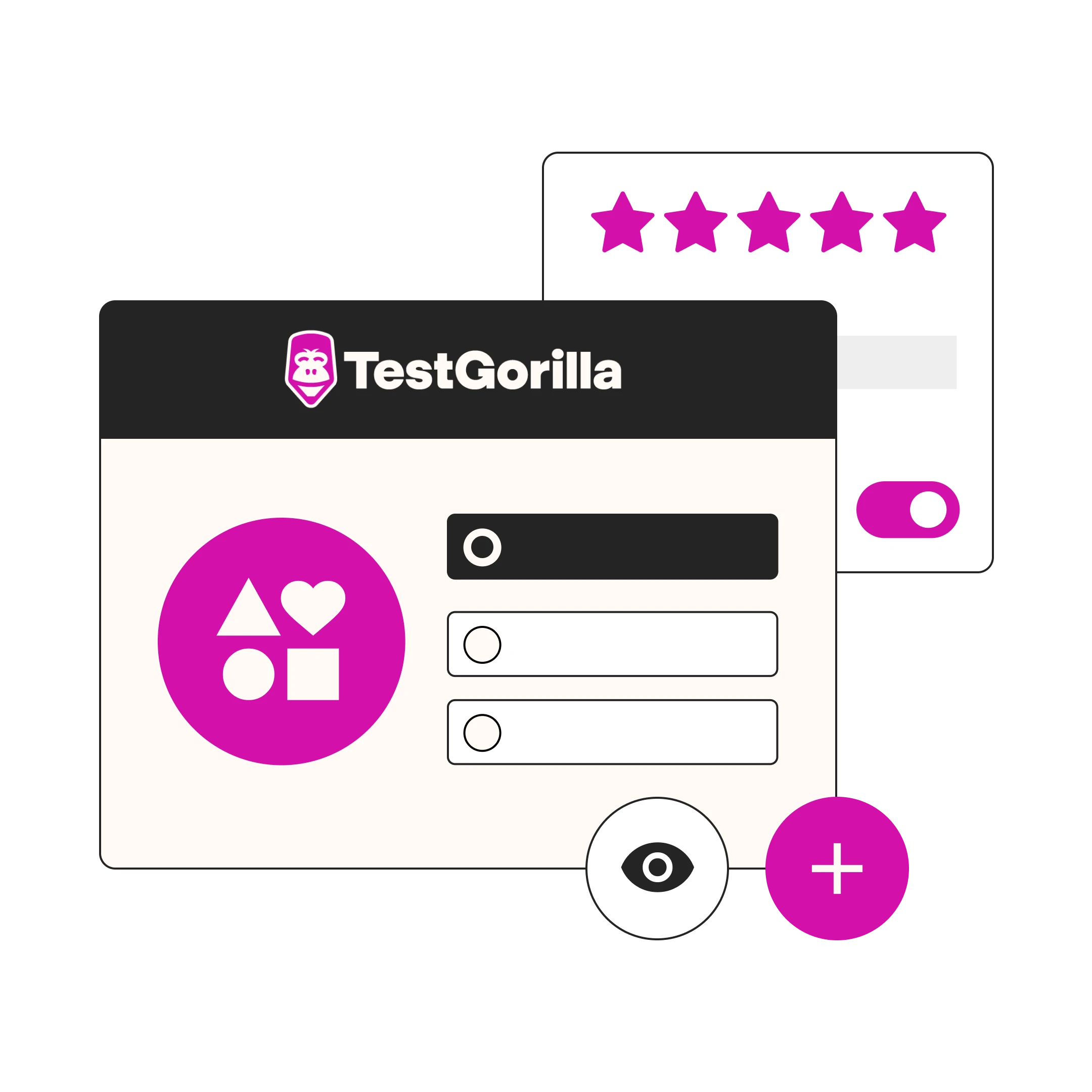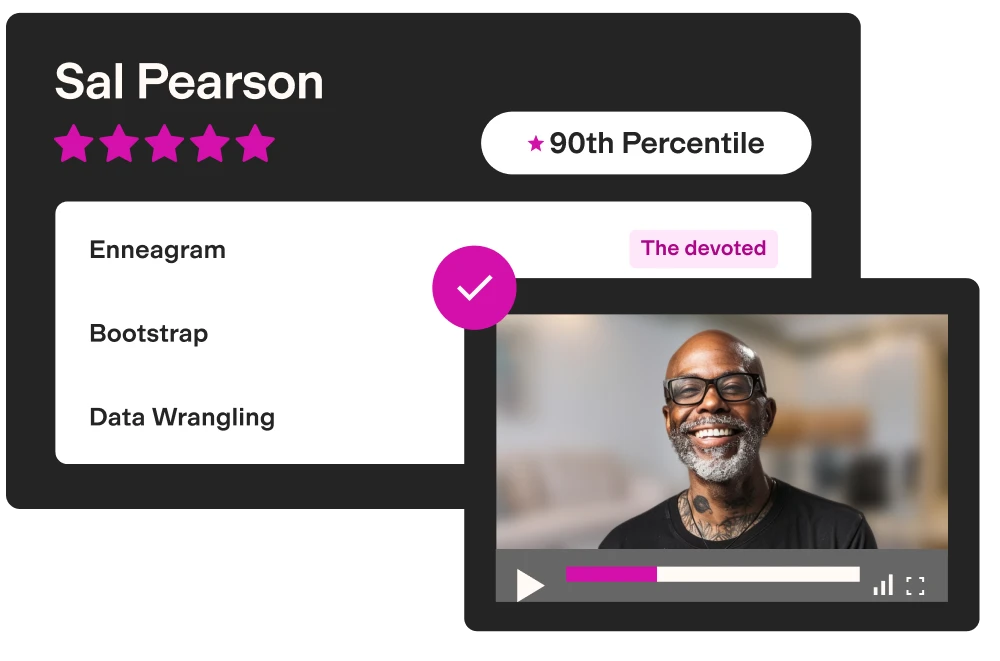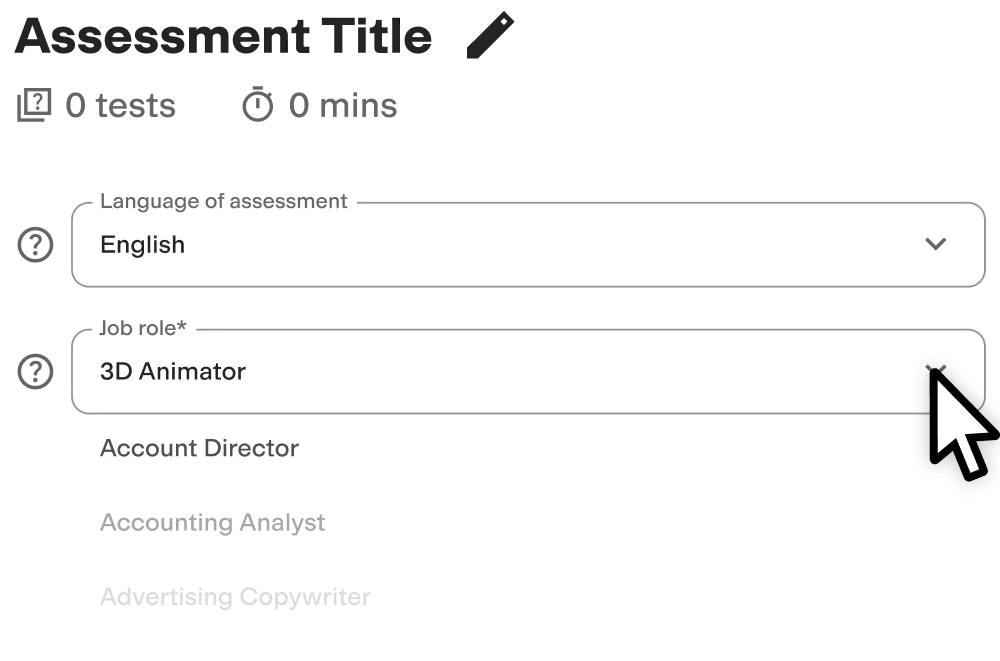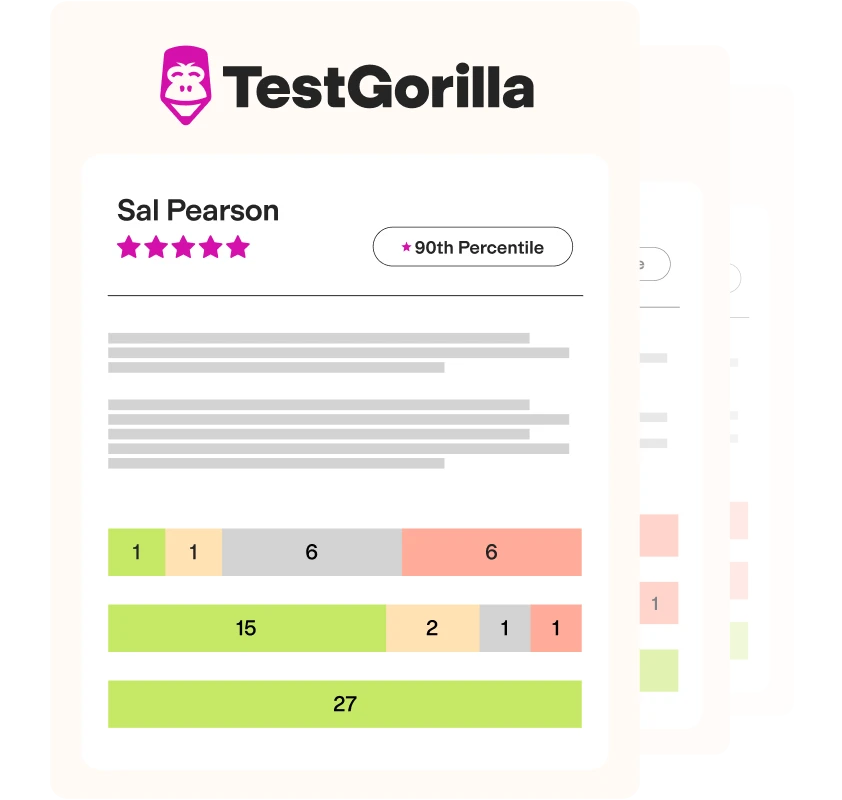Time Management test: Pre-employment screening assessment to hire the best candidates
Summary of the Time Management test
The Time Management test evaluates candidates’ ability to manage their time well in a professional environment. Through typical workplace scenarios, this test assesses how well candidates can prioritize, plan, execute, and reflect on tasks and projects.
Covered skills
Prioritization
Planning
Execution
Reflection & communication
Use the Time Management test to hire
Any role that requires good time management skills.
About the Time Management test
Employees who manage their time well, manage their work well. Good time management allows employees to work more efficiently and become more productive by focusing on what’s important and will have the greatest impact on the business, without getting lost in busy-ness that brings no results. It also leads to better decision-making, less procrastination, and higher quality work overall.
This Time Management test evaluates candidates’ skills to prioritize tasks according to deadlines, importance, and impact, to plan their work in the most efficient way, and to execute tasks effectively. It also assesses candidates' ability to reflect on their work, monitor its outcomes, and communicate important information with others. The test provides candidates with real-life workplace scenarios and asks them to make the best decision to solve each situation in the most efficient and productive way.
Candidates who perform well on this test can separate urgent from important tasks and how each impacts their goals and the business goals in order to prioritize work for the greatest results. They can plan their own work accurately and coordinate with others well to achieve more without expending unnecessary effort. They can manage distraction to stay focused on their work and manage the quality of its outcome. Finally, they’re capable of reviewing their own work as well as the work of their peers and make any adjustment necessary to their workflow.
The test is made by a subject-matter expert
Allen F.
Allen is a professional Engineer, management consultant, and business leader turned full-time dad to 3 toddlers and Founder of a consulting company. Allen has saved individuals and organizations 180.0 Years and over $4.7 Billion by helping them define, weigh, and apply what they value, to empower fulfilling, regret-proof decisions.
His expertise includes decision/management science, business process improvement, leadership/management, simulation/economic modeling, and many more.
Crafted with expert knowledge
TestGorilla’s tests are created by subject matter experts. We assess potential subject-matter experts based on their knowledge, ability, and reputation. Before being published, each test is peer-reviewed by another expert, then calibrated using hundreds of test takers with relevant experience in the subject.
Our feedback mechanisms and unique algorithms allow our subject-matter experts to constantly improve their tests.
What our customers are saying
TestGorilla helps me to assess engineers rapidly. Creating assessments for different positions is easy due to pre-existing templates. You can create an assessment in less than 2 minutes. The interface is intuitive and it’s easy to visualize results per assessment.

VP of engineering, mid-market (51-1000 FTE)
Any tool can have functions—bells and whistles. Not every tool comes armed with staff passionate about making the user experience positive.
The TestGorilla team only offers useful insights to user challenges, they engage in conversation.
For instance, I recently asked a question about a Python test I intended to implement. Instead of receiving “oh, that test would work perfectly for your solution,” or, “at this time we’re thinking about implementing a solution that may or may not…” I received a direct and straightforward answer with additional thoughts to help shape the solution.
I hope that TestGorilla realizes the value proposition in their work is not only the platform but the type of support that’s provided.
For a bit of context—I am a diversity recruiter trying to create a platform that removes bias from the hiring process and encourages the discovery of new and unseen talent.

Chief Talent Connector, small business (50 or fewer FTE)
Use TestGorilla to hire the best faster, easier and bias-free
Our screening tests identify the best candidates and make your hiring decisions faster, easier, and bias-free.
Watch what TestGorilla can do for you
Create high-quality assessments, fast
Building assessments is a breeze with TestGorilla. Get started with these simple steps.
View a sample report
The Time Management test will be included in a PDF report along with the other tests from your assessment. You can easily download and share this report with colleagues and candidates.
The importance of pre-employment time-management testing for candidates
Employees with strong time-management skills are more productive, organized, and likely to meet deadlines – in short, they help you reach your business goals in the most efficient way possible. Time management is a key skill, especially for modern management and leadership positions.
Time management has become a core skill that most applicants list on their resumes. But if you don’t test their skills before you hire them, you might find yourself with an employee who can’t keep pace with your organization.
Fortunately, time-management quizzes and tests are a great way of evaluating candidates’ time-management skills before you move them along in the hiring process.
What are the benefits of giving a Time Management test to candidates?
From streamlining the hiring process and reducing hiring bias to making better-informed hiring decisions, time-management testing is a quick and easy way to test candidates before investing more time in those who don’t have the time-management skills your organization needs to thrive.
The move to skills-based hiring processes should be one of your top priorities if you want to hire the best candidates. Time-management testing helps you minimize the unconscious biases that creep into most traditional hiring processes, making your candidate shortlisting methods fairer.
Plus, a Time Management test enables you to cut out one of the most time-consuming and arduous parts of the recruitment process: resume screening. By eliminating this step from the hiring process, you’re able to focus solely on the candidates who have the time-management skills needed for the role.
Which roles can you use time-management testing for?
Time management is a key skill for the majority of roles across all industries. However, time management is even more crucial for fast-paced roles in which employees must meet deadlines or juggle competing projects and/or customers.
Ultimately, it’s up to you as an employer or hiring manager to decide how essential time management is for the role. However, we recommend time-management testing for roles in which an employee’s ability to manage their own time directly impacts your organization’s ability to reach its objectives.
Recruiting with a time-management assessment
Time management is a much-sought-after skill and quality. But when a candidate lists “excellent time-management skills” on their resume, how can you be sure their version of good time management is the same as yours?
Hiring managers and recruiters are short on time, and when they receive hundreds of resumes all listing the same skills, shortlisting candidates can be a tedious task. Time-management testing is a necessary activity for companies that are serious about hiring only the best candidates who can effectively manage deadlines and plan their workload with business goals in mind.
When should you test candidates’ time management skills?
If time management is a key skill for your open role, you should perform candidate testing at the beginning of the recruitment process. In fact, time-management tests are best administered at the top of the hiring funnel, which means giving candidates the test after you source them and before inviting them to an interview.
Testing candidates early on not only helps you to identify top candidates quickly but also streamlines the recruitment process as a whole.
Each candidate will be asked the same set of time-management-related questions, meaning that once the results are in, you’ll be able to access a side-by-side comparison of each candidate. This ultimately helps you pinpoint those who meet your requirements for shortlisting and those who you can exclude from the hiring process.
Add extra tests to your skills assessment
Although time management is an important skill, it’s not the only skill you should evaluate candidates on. Adding extra tests to your skills assessment helps you gain deeper insight into your candidates’ broader skill sets, capabilities, and profiles.
Depending on the role you’re hiring for, consider adding other tests to the assessment, including:
• Other situational judgment tests, such as communication, negotiation, and leadership tests
• Cognitive ability tests, including numerical reasoning, attention to detail, problem-solving, and critical thinking tests
• Personality and culture-add tests, including Enneagram, Big 5, and 16-types tests
• Role-specific tests that evaluate candidates’ abilities in distinct roles, like an accounts-payable test or a project-management test
Creating a comprehensive assessment that tests candidates’ full set of skills gives you a much fuller view of their profiles as a whole.
How does time-management testing with TestGorilla work?
TestGorilla’s Time Management test, like all TestGorilla tests, has been created by a subject-matter expert and peer reviewed extensively by a second expert. The Time Management test’s questions are calibrated with the help of hundreds of test takers with relevant experience in the subject.
Candidates who take the test are presented with a selection of multi-choice questions related to real-life workplace scenarios and have 10 minutes to choose the answer they believe describes the most efficient solution.
TestGorilla’s Time Management test evaluates candidates’ skills in three key areas, including their ability to:
• Prioritize tasks based on deadlines, importance, and impact
• Plan and execute their work in the most efficient way
• Reflect on work they’ve completed and communicate important information to others in their organization
Once your candidates finish the time-management test, you’ll be able to objectively compare how well each of them performed. The test results are displayed in an overview that ranks candidates from highest to lowest based on the average of their percentile scores.
In summary
Time-management testing is a simple, quick, and effective way to evaluate candidate skills without spending hours screening resumes. In addition to identifying the top candidates to move on to the interview stage, time-management testing also helps you avoid making expensive mis-hires.
By using TestGorilla’s Time Management test together with other skills tests, you’ll be presented with the data you need to make better, more informed hiring decisions from the get-go.










